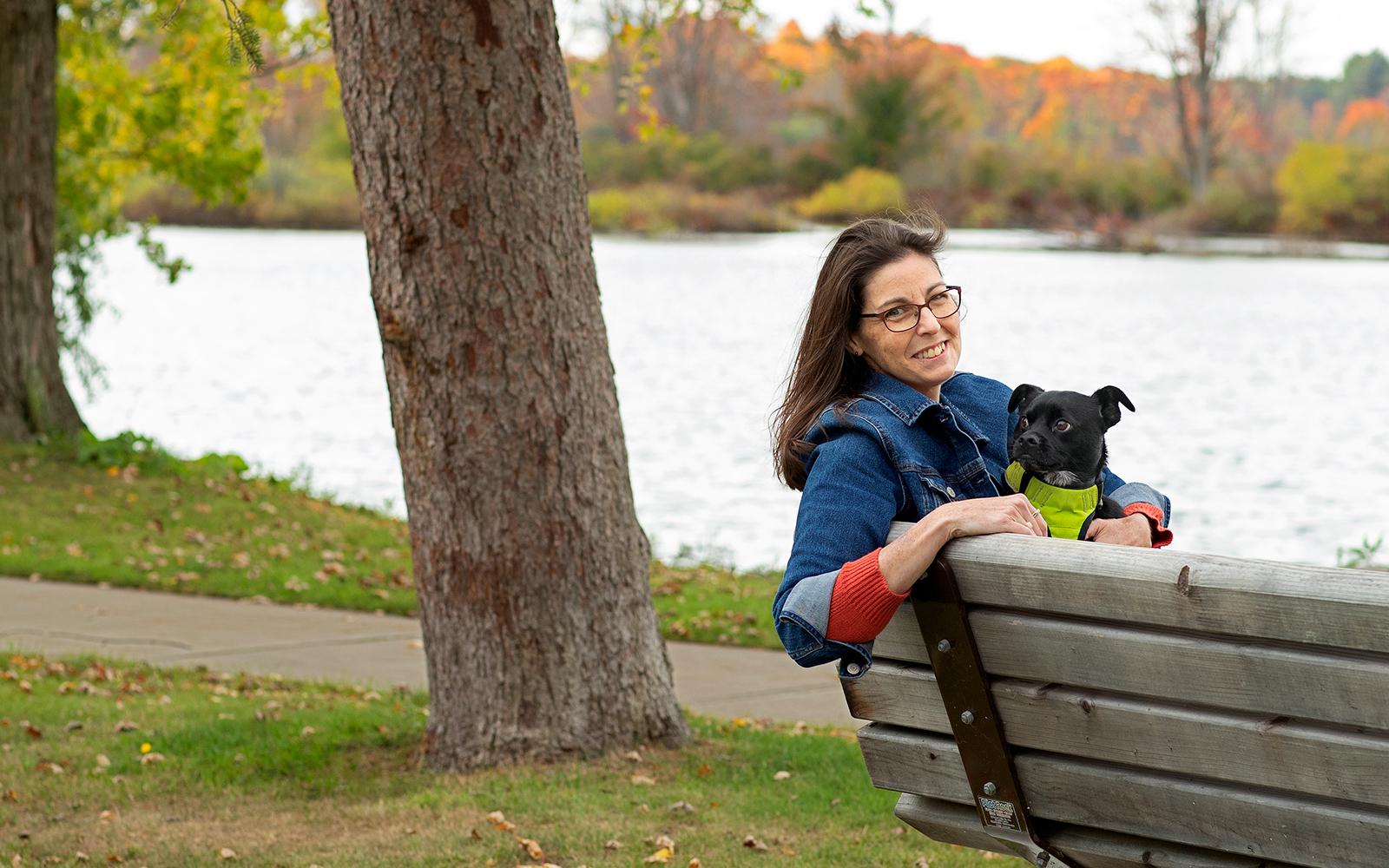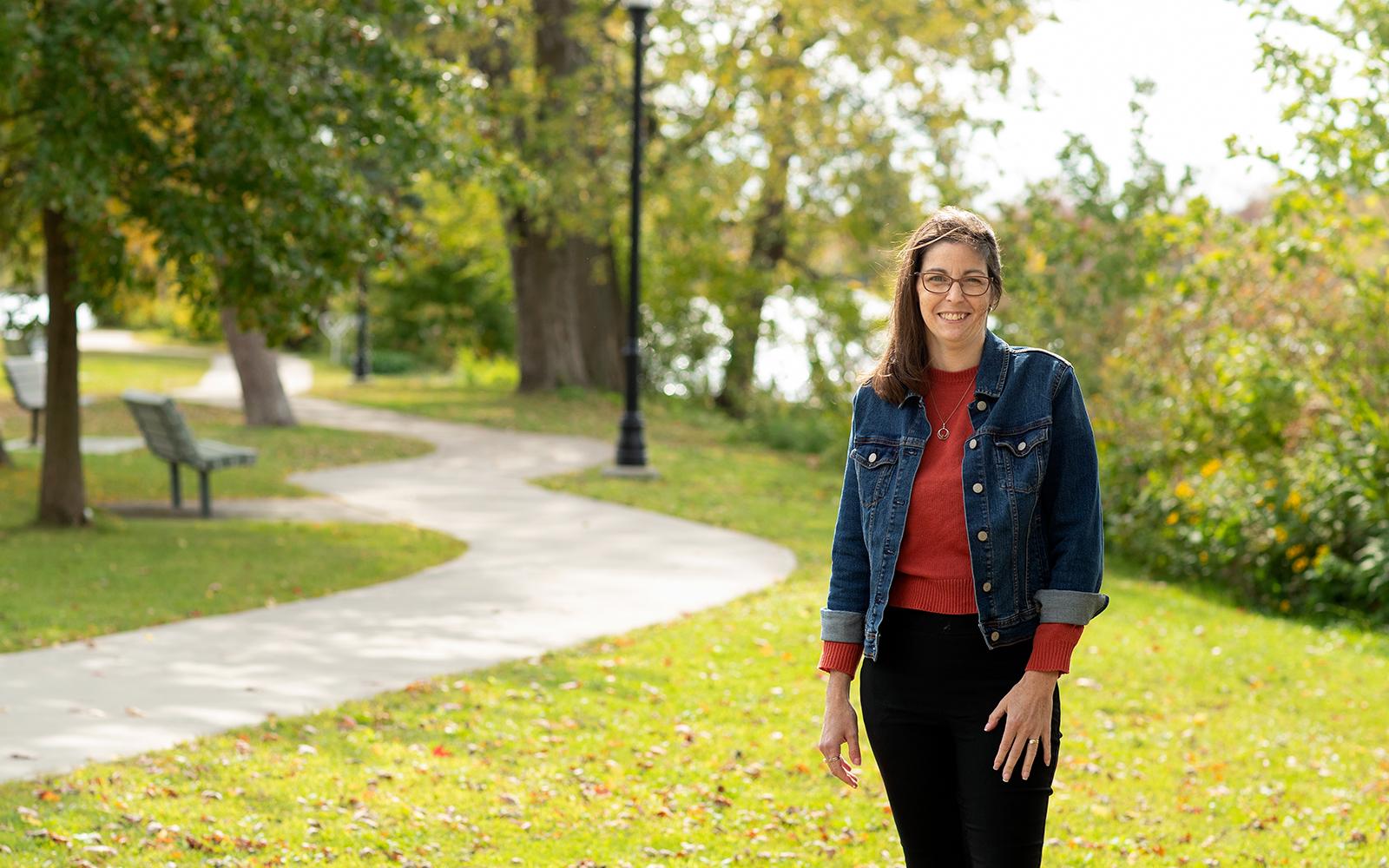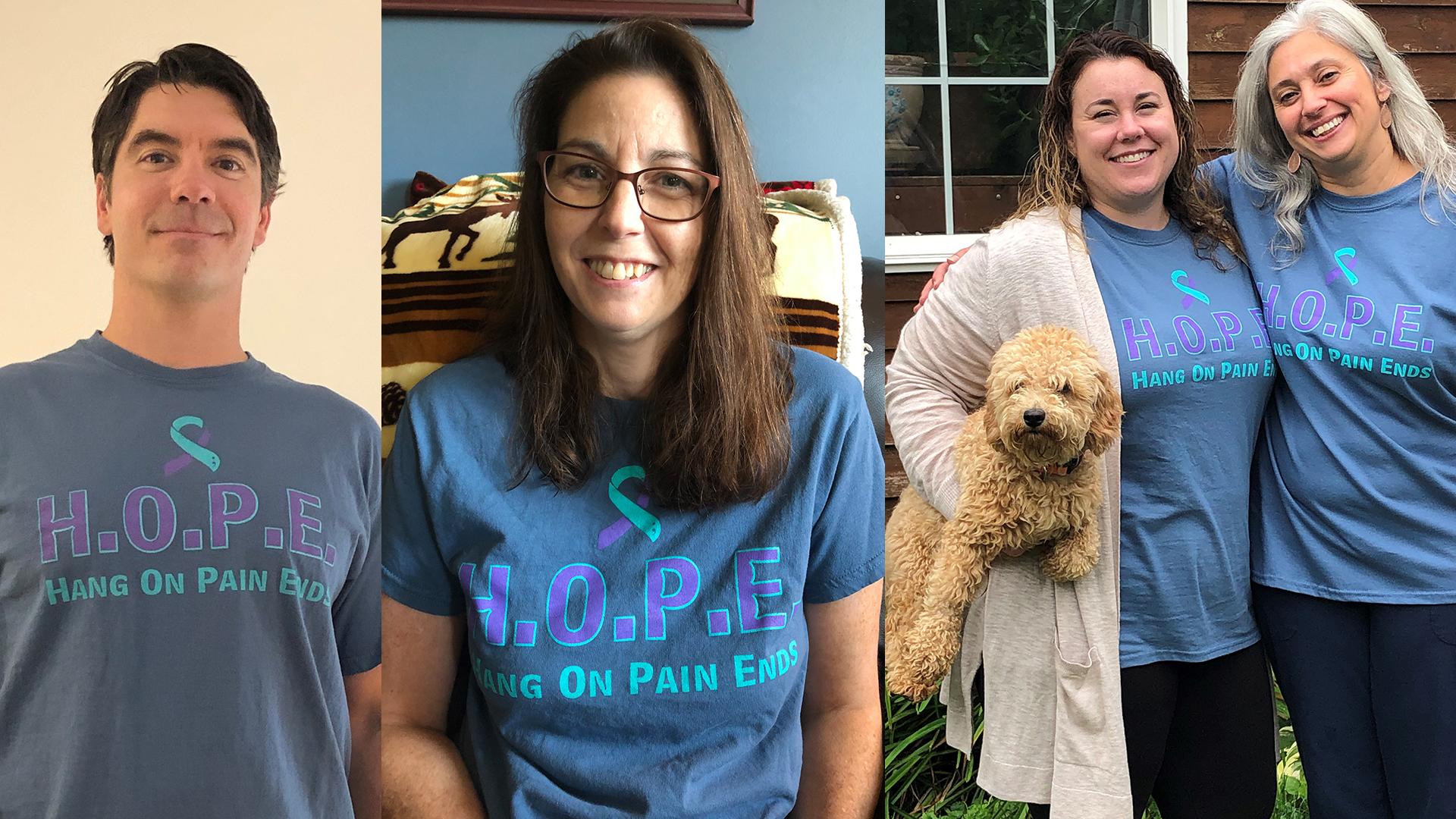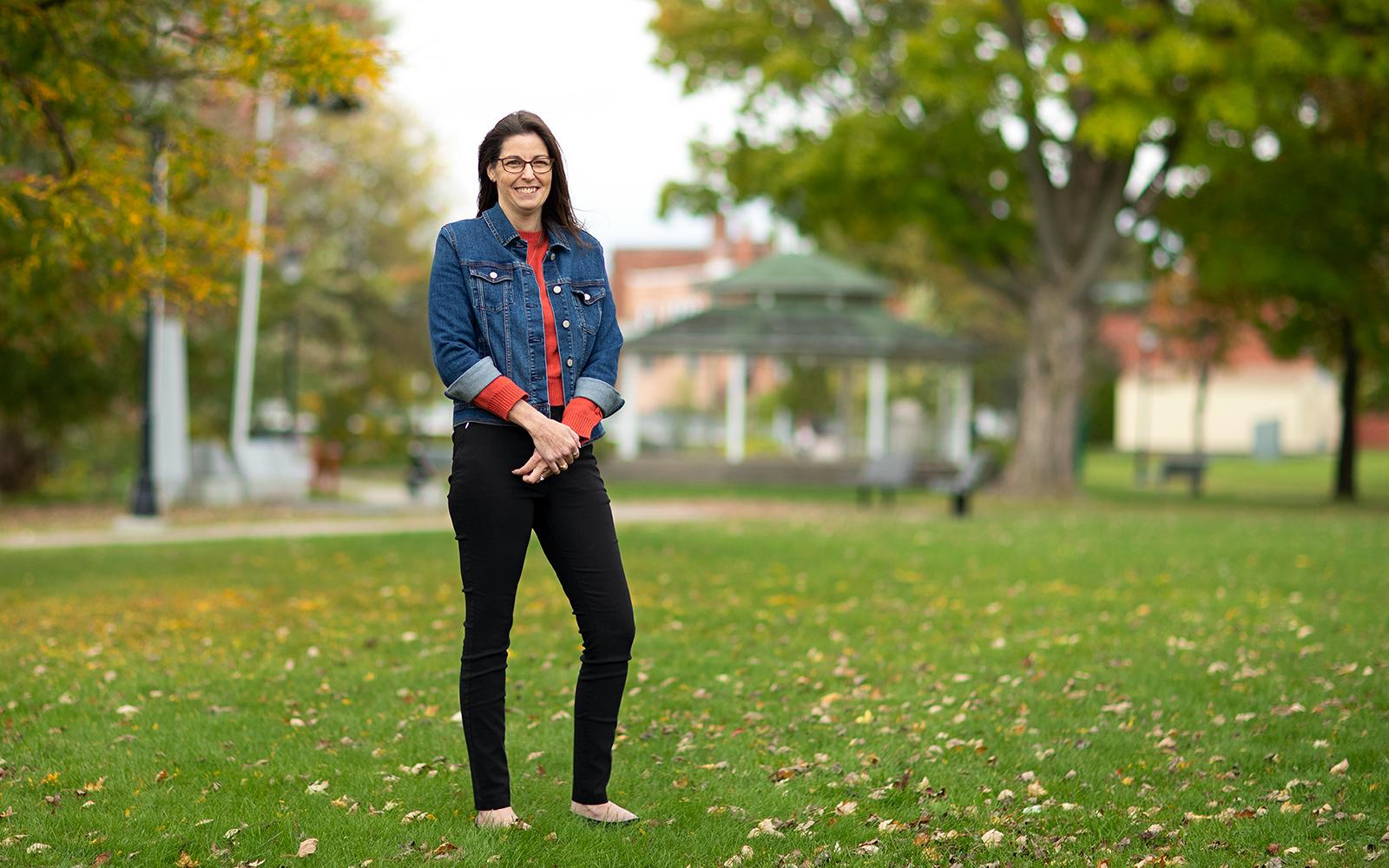SUNY Potsdam Counselors Battle the Second Crisis of COVID: Mental Health
The scorching days of summer descend into cooler nights as leaves showed off their brilliance and bonfires became the evening ritual. Then September brought dramatic change to our small communities. Children returned to school, parents and guardians take a deep breath as routine returned to their homes, and college students brought energy and financial stability to our businesses.
For college towns, fall is typically a time of renewal and hope. This September however, not unlike the 2001 crisis of 9/11, brought fear, anxiety and division as we grappled with a multitude of choices. Opening colleges created anxiety about students returning from across the state, country and world. Political unrest, increasing hatred, racism and division have been devastating outcomes of the trauma being experienced on a world-wide scale. It’s been overwhelming.

SUNY Potsdam's Counseling Center Director Gena Nelson poses for a portrait with her dog Gibbs, also a therapy dog on campus.
Students entering and returning to our area colleges have not experienced this level of trauma in our country. Traditional aged students have been raised in a time where there is always war, where death is seen on the evening news and where hatred is easily spewed on social media. We argue that this generation has little distress tolerance, but perhaps we should start to acknowledge the level of “distress” that has become normal. Adding a worldwide crisis unlike any seen in our country for 100 years has caused an acute trauma response for most of us. We feel it as a frenetic sense of having too much to do, less patience and a knot in our stomachs that grows larger as we near November. It’s a unique time where parents, professors and professionals need to find strength and creativity to engage this generation and continue to instill hope while grappling with its existence themselves.
Mental Health has become the second crisis of the pandemic. As a therapist, I’ve found it crucial to acknowledge the impact this trauma is having on all of us. At SUNY Potsdam, symptom severity and demand for services has already been steadily rising the past 10 years. Our percentage of students accessing counseling has increased from 12 to 21 percent in the past six years alone; always significantly higher than the national average. Now, negative mental health symptoms for our students are heightened while coping strategies are minimized and face-to-face counseling isn’t a safe option. We’ve had to get creative to support our campus through this pandemic and increased anger and hatred.

Nelson poses for a portrait in Ives Park.
To make an appointment at the Counseling Center, students can call the office at (315) 267-2330 or email counseling@potsdam.edu.
It seems more fitting than ever that September was Suicide Awareness Month. Our office in the College Counseling Center usually hosts hundreds of community members during its annual Suicide Awareness Walk. It forces conversation on difficult topics and kick-starts our semester with support, connection and hope. It was difficult to have this bookend be another victim of COVID-life, however it created space for necessary tele-counseling training, virtual program planning and a whole new protocol for therapy.
While face-to-face interaction will always be the preferred method, we strive to see the advantages of tele-counseling. Many students report it’s easier to jump online for counseling from the convenience of their residence hall, apartment, or nearest park bench. Virtual support group participation has increased; depending on the type of group, students can start of a couple of minutes late or leave early for a class with little disruption. Mental Health programs can be pre-recorded, a concept not considered before. Faculty assign the recordings to their students, giving more flexibility in the teaching schedule and less time for counselors to be away from student appointments. Increased collaboration with our Campus Life office has allowed all students access to our programs about suicide prevention, mental wellness, trauma and coping strategies.

From left, SUNY Potsdam Counseling Center Staff Josh Brown, Nelson, Miranda Groebler, and Christina Snell.
The increased mental health crisis has required increased attention to marginalized populations. Fighting for equity and inclusion is challenging without being in person, but far from impossible. The Student Tele-Counseling Network (STCN), that we applied for through SUNY, gives us an opportunity to increase free psychiatric support for all students. Eligible students can request a therapist of color when the experience of cultural trauma is important in their healing. Joining in Black Solidarity Day programming and working with the Gender Student Alliance office has allowed us greater ability to show support for our black, brown and LGBTQAI+ students. Bi-weekly staff meetings to discuss our white privilege humbly reminds us of the fortune and safety that 40 percent of our student population lives without.
Our 15-year Peer Counseling program, taught and supervised by two of our staff, connects trained students to their peers, which is especially important during a period of such isolation. Our staff’s dedication to committees such as Diversity and Inclusion, Faculty and Staff Wellness, Emergency Response, Behavioral Expectation, and Police Advisory ensures that positive mental health is always a current running through our campus. The ways we work outside the six-foot, socially-distanced box to provide mental health support gives us purpose, a crucial piece of our counselors’ own ways of coping with this crisis.

Nelson poses for a portrait in Ives Park.
Additional safety is found by relying on our counseling family. While this sounds cliché, you ask any one of us and we’ll easily explain it through the smile under our mask. Our responsibility to carry the mental safety of the campus is not taken lightly, especially as the current crisis increases the level of distress for everyone. We rely on each other to instinctively know the weight this responsibility brings and the impact of it on our own mental health. Birthday balloons on each other’s lawns, a favorite tea left in a mailbox, text celebration of a co-workers wedding, and encouragement for time off Zoom are the ways we share the weight. September began as a month of anticipated grief and bets on worst-case scenarios. As the month ended our little family has adapted and flourished as has the rest of the campus and community.
We’re all doing the best we can and are reassured that no one else has perfected COVID-life either. We know more than most that mental health struggles are normal right now.
Article by Gena Nelson, Director of Counseling
For information about the Counseling Center, visit: https://www.potsdam.edu/studentlife/wellness/counseling-center
Crises 24-Hour Hotlines
Suicide Hotline:
1-800-SUICIDE (1-800-784-2433)
1-800-273-TALK (1-800-273-8255)
Reachout:
(315) 265-2422
Renewal House:
(315) 379-9845
The Trevor Project:
1-866-488-7386
Tribal Support:
1-800-622-HELP (4357)
University Police:
(315) 267-2222
Ulifeline:
www.ulifeline.org
Crisis Text Line:
Text Got5 or HOME to 741741
